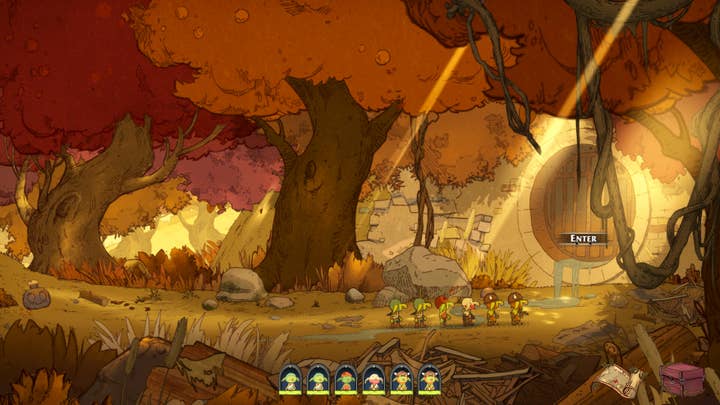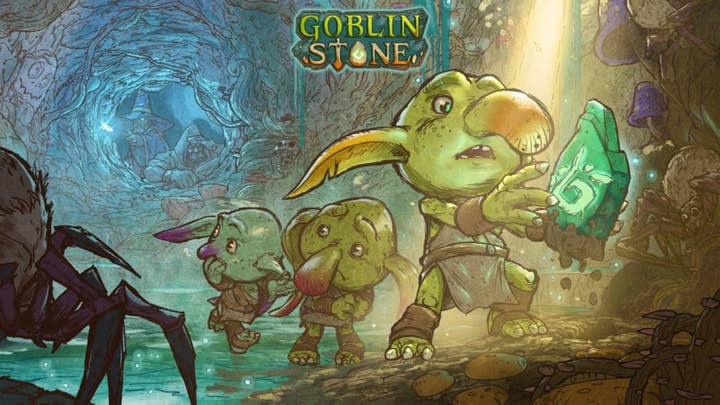From California to the Philippines with friendly goblins: The story of Orc Chop Games
Vince McDonnell shares the creative process behind Orc Chop Games's debut title, and the realities of making games in the Philippines
Goblin Stone, the debut title from Orc Chop Games, has two stories behind it. The narrative of the game itself is of innocent goblins turning the tables on the adventurers that so frequently invade their home, inverting a typical fantasy trope.
The story behind the game, meanwhile, is one of a married couple forming a new studio on the success of their mobile zombie game and moving from the US to the Philippines.
Co-founders Vince and Susan McDonnell first hit was Zombie Farm, a mobile title they self-published under former studio The Playforge. The revenue it generated enabled Vince to pursue a long dreamed-of career in console games development, forming a new studio with Susan to make a different type of game.
"I was yearning to go back to creating console games because those are the games I enjoy," Vince McDonnell tells GamesIndustry.biz. "So we used what we earned from Zombie Farm to fund this venture."

Development for Goblin Stone — which releases on Steam today — began while the studio was still based in California, with Orc Chop Games truly taking shape after McDonnell reached out to a partner in Beijing to help build a development team. Orc Chop Games then relocated to the Philippines, settling in the country's capital Manila.
McDonnell highlights that setting up the studio in the Philippines came with its advantages, the most notable being the cost of labour.
"If we were to have this same personnel account [of 12 people] back when I was in San Francisco, that'd be much more expensive," he explains. "Here, we're able to have more people and more talent with the budget that we're constrained with which allows us to develop more and release the product sooner than we would have otherwise."
He also notes that studios like Orc Chop Games, ones that are working on their own IP rather than outsourcing, are hard to come by in the Philippines. But that helps with enticing talent to their studio.
"The studios you find here, the ones that people gravitate towards after they graduate, mostly do outsourcing for bigger companies like CD Projekt Red – there are a lot of studios here that cater to AAA studios like that. And because of that, there are groups of developers who want to work for companies similar to that, where they work on their own IP so we're able to capitalise on that kind of talent and induct them into our studio. And that's quite attractive for a certain group of people who have this dream."
That's not to say Orc Chop Games hasn't faced challenges in hiring. McDonnell says that VFX artists are surprisingly hard to come by, despite there being a lot of VFX artists for film in the area, among other constraints.
"Being a VFX artist [for games] isn't quite common here, unfortunately," he says. "So that's another role we're looking for. We're also trying to hire people to work on site, but that criteria somewhat limits us as well. It's one of many challenges, but we're looking to expand."

As a self-funded studio, McDonnell says that Orc Chop Games is looking to focus on expansion and to maintain its independence through self-publishing Goblin Stone rather than partnering with a third-party publisher.
"We did explore looking for a publisher, and the goal for that really is to have someone help us port the game to consoles because there's an additional cost associated with that," he explains. "We were toying with the idea of having a simultaneous release on console and Steam, but we opted to go with a Steam release first and from the initial earnings we'll do things like additional localisation and porting for consoles."
For now, though, the focus is releasing the game on Steam and showcasing Goblin Stone's shift on the fantasy genre with its depiction of goblins.
McDonnell explains that the main goal with Goblin Stone was to invert expectations and erase stereotypes for its lead characters: a group of goblins whose main goal is to protect their homeland and recover from near extinction.
Erasing stereotypes in the fantasy genre involves taking a different approach to everything from flipping the expected nature of certain creatures right down to character design.
"When you think of goblins, it's more like the ones you'd see in World of Warcraft – everything is sharp and scary," he says. "So we had to somehow keep a few elements that make a goblin a goblin without all the edginess that comes with it. That's why they're based on oval shapes, with a big bulbous nose and circular face. They still have claws and some have sharp teeth, but it's done in a way that doesn't make them appear villainous, a lot of careful consideration was put there."
Goblin Stone does not shy away from fantasy fans' expectations entirely, though; for example, the tale of the goblins is told through the lens of a storybook. This made for an easier format to work with on the development side too, as the team didn't need to create "intricate cut scenes" with the limited resources they had.
"The game is narrated so it's almost like you're flipping through the pages of a storybook," McDonnell explains. "It was this aspect that really influenced what the game would look like. It was also inspired by me flipping through Dungeons & Dungeons Monster Manual as a kid; I wanted to try and see if we could at least have some element of that art style in there, too."
"When you think of goblins, everything is sharp and scary. So our designs have elements that make a goblin a goblin without all the edginess that comes with it"
This attention to detail resulted in Goblin Stone spending a lot of time in development, which created challenges among the team when faced with having to decide what elements to keep and what to cut.
"It was very tough for me to say, let's just scrap all this stuff that we worked on, let's find a different direction," he notes. "It's really hard to kill an idea, especially if you've invested a lot into it already. But we have a good team and we're able to talk about what works and what doesn't."
While McDonnell says he and the Orc Chop team are trying to "manage expectations" for Goblin Stone, they're looking forward to seeing how players react to the world they've created.
"We're expecting it to do well so we can continue the franchise, do some ports, add additional languages and DLCs," he says. "And then, further down the line, I really want to create a franchise based on this universe – that's where I want to see Orc Chop Games in the future."
Sign up for the GI Daily here to get the biggest news straight to your inbox









